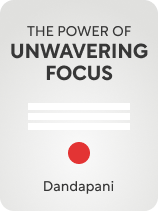

This article is an excerpt from the Shortform book guide to "The Power of Unwavering Focus" by Dandapani. Shortform has the world's best summaries and analyses of books you should be reading.
Like this article? Sign up for a free trial here.
Are you pulled away by distractions? How does willpower redirect your focus?
To deal with distractions, you need the complementary tool of willpower: a source of mental strength you can call on when a task requires more effort. Much like focus, willpower is an ability that you can develop through practice.
Continue reading to learn how to develop willpower with Dandapani’s advice from The Power of Unwavering Focus.
Develop Willpower Through Daily Exercises
Dandapani recommends that you learn how to develop willpower with daily practice. He suggests incorporating the following principles into daily focus practice.
1) Finish the tasks you begin. Dandapani explains that every time you start a task, you begin with a burst of enthusiasm, excited by the possibility of achievement. However, as you get tired or frustrated, the initial burst will wear off and you’ll have to call on your willpower to complete the task. If you allow yourself to abandon tasks before you complete them, you’ll weaken your willpower, but if you practice finishing them, you’ll strengthen it.
2) Always do the job well, no matter how long it takes. Putting in the extra effort to do a thorough job will strengthen your willpower. Conversely, rushing carelessly through a task will weaken it, because you won’t need to call on your willpower as much as if you did a thorough job. For example, if you’re cleaning a cupboard, take the time to get all of the hard-to-reach places.
3) Do slightly more than you planned. When you’ve almost completed the task, come up with an additional finishing touch that you didn’t plan on when starting out. Dandapani explains that by calling on your willpower one last time before completing each task, you’ll continue growing this capacity. For example, if you’re changing your bicycle tire, you could also take a minute to lubricate your chain and gears or test the pressure on your other tire.
| Developing Willpower by Overcoming “Pain Points” Charles Duhigg’s arguments in The Power of Habit shed light on how Dandapani’s principles exercise your willpower. Duhigg explains that every difficult activity involves “pain points”: specific moments of difficulty we experience while carrying out a task, and where we’re most likely to bail. He writes that predicting a task’s pain points can allow you to plan ahead and think about how you’ll push through them. Dandapani’s techniques offer a plan for dealing with common pain points. His first principle suggests that you will likely encounter a pain point after your initial burst of enthusiasm for a task wears off. In his second principle, he cautions against responding to the pain point by trying to rush through the rest of the task instead of calling on your willpower to finish it at a focused pace. Finally, his last principle suggests that you may encounter a pain point right when you’re almost done with the task—anticipating the relief of being finished. Therefore, he asks you to call on your willpower one more time and do just slightly more than you planned. |
Develop Willpower Through a Long-Term Exercise
Dandapani also recommends a long-term exercise to develop your willpower:
1) Make a list of five things you began in recent years but didn’t finish, or things you told people you would do but didn’t complete. These could be hobbies, home improvement projects, or other personal goals, but they need to be things that you can still achieve.
2) In your spare time, complete the items on your list one by one. For each one, use Dandapani’s three daily willpower-developing principles: Finish tasks you begin; always do the job well, no matter how long it takes; and do slightly more than you planned.
(Shortform note: In Can’t Hurt Me, David Goggins elaborates on the value of returning to past failures for personal growth. He writes that every failure has lessons to teach you about what you could do differently. As you develop your willpower by picking up abandoned projects that you wish you’d finished, consider reflecting on why you never finished them. What got in your way, and what could you do differently next time? Goggins recommends reflecting on these past failures by journaling. He also encourages you to share your successes with others when you finally succeed.)

———End of Preview———
Like what you just read? Read the rest of the world's best book summary and analysis of Dandapani's "The Power of Unwavering Focus" at Shortform.
Here's what you'll find in our full The Power of Unwavering Focus summary:
- How focus isn't just something that happens to you—it's a learned skill
- Why focus is so important and how to improve your focus
- The unexpected benefits of wiggling your toes






